Welcome back to This Week in Apps, the weekly TechCrunch series that recaps the latest in mobile OS news, mobile applications and the overall app economy.
The app industry continues to grow, with a record number of downloads and consumer spending across both the iOS and Google Play stores combined in 2021, according to the latest year-end reports. App Annie says global spending across iOS, Google Play and third-party Android app stores in China grew 19% in 2021 to reach $170 billion. Downloads of apps also grew by 5%, reaching 230 billion in 2021, and mobile ad spend grew 23% year-over-year to reach $295 billion.
In addition, consumers are spending more time in apps than ever before — even topping the time they spend watching TV, in some cases. The average American watches 3.1 hours of TV per day, for example, but in 2021, they spent 4.1 hours on their mobile device. And they’re not even the world’s heaviest mobile users. In markets like Brazil, Indonesia and South Korea, users surpassed five hours per day in mobile apps in 2021.
Apps aren’t just a way to pass idle hours, either. They can grow to become huge businesses. In 2021, 233 apps and games generated over $100 million in consumer spend, and 13 topped $1 billion in revenue, App Annie noted. This was up 20% from 2020, when 193 apps and games topped $100 million in annual consumer spend, and just eight apps topped $1 billion.
This Week in Apps offers a way to keep up with this fast-moving industry in one place with the latest from the world of apps, including news, updates, startup fundings, mergers and acquisitions, and suggestions about new apps and games to try, too.
Do you want This Week in Apps in your inbox every Saturday? Sign up here: techcrunch.com/newsletters
Top Stories
PUBG Mobile maker Krafton sues rival game maker Garena, Apple and Google, over ‘clones’
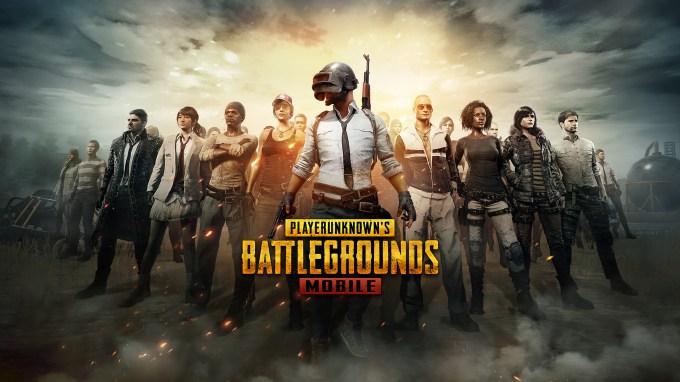
Image Credits: PUBG Mobile
Krafton, the developer behind PlayerUnknown’s Battlegrounds,” and the maker of PUBG Mobile, last year’s No. 6 top-grossing mobile game on a global basis, is suing the app stores and a rival game maker, Garena, over copyright infringement involving Garena Online’s Free Fire games. The lawsuit alleges Garena’s games copy numerous aspects of its own, including its opening, its game structure and play, the combination and selection of weapons, armor and unique objects, locations and the overall color schemes, materials and textures. Google’s YouTube is also named in the lawsuit for hosting videos of the infringing material.
Garena has responded to the lawsuit saying, “Krafton’s claims are groundless.”
The suit aims to prove that Garena’s games — Free Fire and Free Fire MAX — aren’t just another variation on the battle royale format, but are legally infringing on Krafton’s copyright. This could get complicated as PUBG Battlegrounds itself was built using a combination of in-house work and third-party store-bought assets, the company has said in the past.
Krafton has often defended its gaming empire, having more recently won a lawsuit against cheaters. PUBG also previously settled copyright claims with NetEase, also over PUBG clones, but had dropped a similar suit with Epic Games over Fortnite in 2018.
The interesting thing about this case is that Krafton is looking to hold the app stores accountable for their roles, too. This comes at a time when Apple and Google’s power over their platforms is weakening under threat of regulation and, in some cases, new laws. There’s a very real question in the air right now about how the tech giants get to choose which apps appear on their stores, how those apps operate and how much money they deserve for hosting the apps. Krafton’s suit aims to make the app stores responsible for decisions that cut into its bottom line — like hosting rip-offs. But the company has to first prove that its popular game has, in fact, been cloned. And that’s for the court to decide.
Apple will have to allow third-party payments in South Korea
A big loss for Apple…or is it? A decision by the Korea Communications Commission (KCC) will require Apple to support third-party payment options in iOS apps for the first time in any market. But the change won’t necessarily mean developers get to keep all their in-app purchase revenue for themselves. When Google outlined its plans to comply with the new law in November, it said it would reduce the developer’s service fee by 4% if they were using an outside payment system. For example, a developer paying a 15% commission would now pay 11%. That’s better than it was before, but not what developers may want. The KCC said it will talk with Apple about its own compliance plans and iron out the details, including fee structures and when the plan will go into effect.
The law is an example of how well-intended legislation can go wrong as the platform makers can still argue they deserve a sizable commission for hosting the apps on their marketplaces, not just processing their payments.
A better way to open up to third-party payments is by getting a legislative body, regulator or court to rule that iOS apps can link to their own websites where users can pay for subscriptions, purchases and other services outside the App Store. This is effectively what Epic Games won the right to do in its lawsuit with Apple, but Apple appealed the decision and the required changes were put on hold.
Fortnite returns to iOS…kind of!
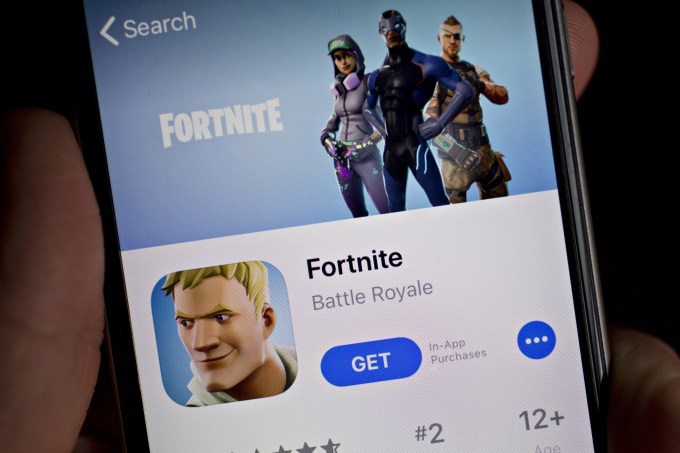
Image Credits: Andrew Harrer/Bloomberg / Getty Images
Epic Games has been engaged in a legal battle with Apple over its removal of Fortnite from the App Store and Epic’s allegations of Apple’s anti-competitive behavior. As a result of the ongoing litigation, Apple hasn’t allowed Fortnite to return to iOS — even if the company promised to “behave” and play by the current App Store rules. But now, it seems, Fortnite may have found a workaround. If the workaround actually works!
The company has launched its game on Nvidia’s game streaming service GeForce Now, which will allow mobile users on both iOS and Android to play a touch-control version via the web browser. The game, which is only in beta testing, for the time being, is different from the version that streams through GeForce Now to Android users. That one is a streamed copy of the desktop game, while the iOS version is optimized for mobile devices. Fortnite is accepting beta sign-ups with plans to open up to select members in January. If the company gets the game functional on iOS, it could make an interesting twist to Epic’s antitrust claims, as it would prove the App Store isn’t the only path for game makers to serve iOS users.
Weekly News
Platforms: Apple
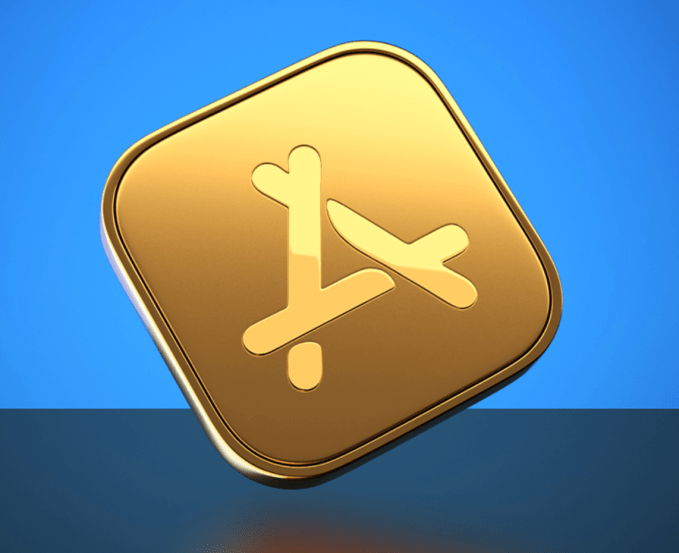
Image Credits: Apple
- Apple has paid out $60 billion to App Store developers in 2021, according to new data shared by the company. This refers to the amount of money developers have made on its platform, less the App Store fees. In previous years, it was easier to figure out how much Apple’s cut was, but now individual apps may pay different percentages if they’re subscription apps in year one or two, or a participant in a dedicated program that offers fee reduction, like those offered to news publishers or small businesses.
- Apple provided new figures for iOS 15 adoption. The latest OS is now installed on 72% of iPhones released in the past four years, which is lower than previous iOS updates — likely because Apple is now allowing users to stay on iOS 14 but opt to receive security updates as needed instead of having to upgrade to the new OS. On iPad, 57% of all new devices released in past four years run iPadOS 15.
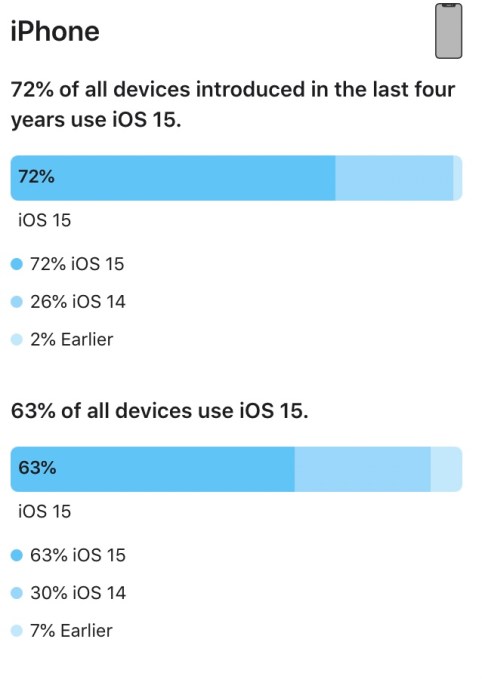
Image Credits: Apple
- Apple released iOS 15.2.1, which patches iPhones and iPads against a HomeKit flaw that could be exploited to launch DoS attacks. The update also addresses an issue where CarPlay apps may lose touch sensitivity and a bug where Messages may not load photos sent using an iCloud link.
- Apple also addressed concerns that some carriers could be blocking iCloud Private Relay on iOS 15.2 devices after T-Mobile noted the problem was occurring on devices on its network. Apple said no carriers have blocked the service and Apple hasn’t made any changes to prevent the feature from working with carriers. T-Mobile is now saying the issue arises if users had previously disabled “Limit IP Address Tracking” in their Cellular Data settings.
- Apple announced price increases for apps and IAPs in the following regions: Bahrain, Ukraine and Zimbabwe. Other regions will not see price changes. but proceeds will be adjusted following tax changes, including The Bahamas, Oman and Tajikistan.
- Apple wiped the Wordle clones from the App Store. Wordle, an indie word game app that runs on the web, has been having a moment. The app was originally built as a side project by Josh Wardle as a gift for his partner, who loves word games. But Wordle has been growing in popularity, recently landing it a high-profile article by The New York Times. (You can read TechCrunch’s founder interview here.) That soon led to several developers looking to cash in on the app’s lack of an App Store presence. One even posted on Twitter about how many downloads his iOS version was getting. In response, Apple began pulling down the copycat apps from the App Store — an interesting decision given that Wordle itself appears to be inspired by an old TV game show, and not an original idea. We understand the developer is appealing.
Platforms: Google
- Android 13 may introduce an easier way to scan QR codes, which grew in popularity amid the pandemic as a way to send payments, read restaurant menus, communicate information and more. (The news is not official but rather provided by a “trusted source” to the blog Android Police.)
- Google is mad about iMessage and Apple’s refusal to support the RCS industry standard. After The Wall Street Journal ran an article about the peer pressure among U.S. teens to use iMessage, Android head Hiroshi Lockheimer tweeted that Apple’s iMessage lock-in was using “bullying as a way to sell products.” He later clarified he’s not asking Apple to support iMessage on Android, but thinks it should support the industry standard for modern messaging, RCS, not just the older standards, SMS and MMS — a change that would benefit iOS users, too.
Fintech
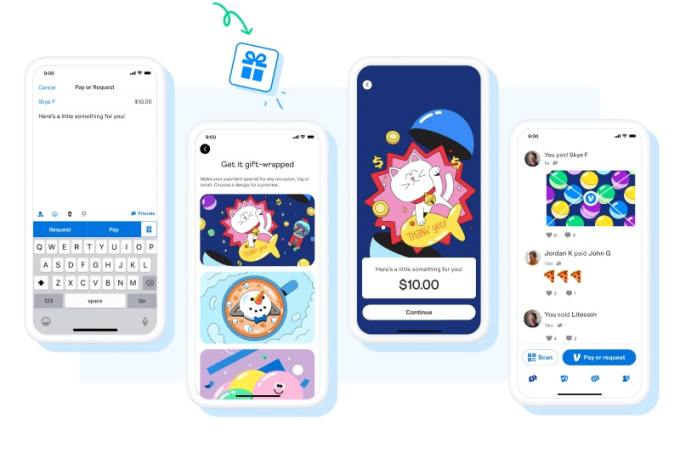
Image Credits: Venmo
- Venmo introduced a new gift-wrapping feature with eight animated designs. The feature lets users virtually “wrap” their gifts of money to family and friends alongside their payment note.
- U.S. fintech Current upped the competition among digital banking services with the launch of a new savings offering called Interest that pays a 4.00% APY. The plan is available to Current’s free and Premium (subscription) users alike. The fine print, however, is that there’s a $6,000 cap across your Savings “pods.” And the rate is paid out on a per-pod basis. Free users can only create one Pod, while subscription users can create three.
- U.S. fintech app Public announced the appointment of two new board members: Jessica Neal, former chief talent officer at Netflix and current venture partner at TCV; and Christopher J. Brummer, a professor at Georgetown, member of the Fannie Mae board of directors, and adviser to Paradigm, a firm that invests in crypto-focused companies.
- Pakistan government’s Federal Investigation Agency (FIA) has reached out to Binance about a $100 million scam operation that defrauded users in the country. The FIA said there are “thousands of victims” across the country who were deceived into transferring funds from their Binance account to other applications, which would crash and keep the funds for themselves.
Social
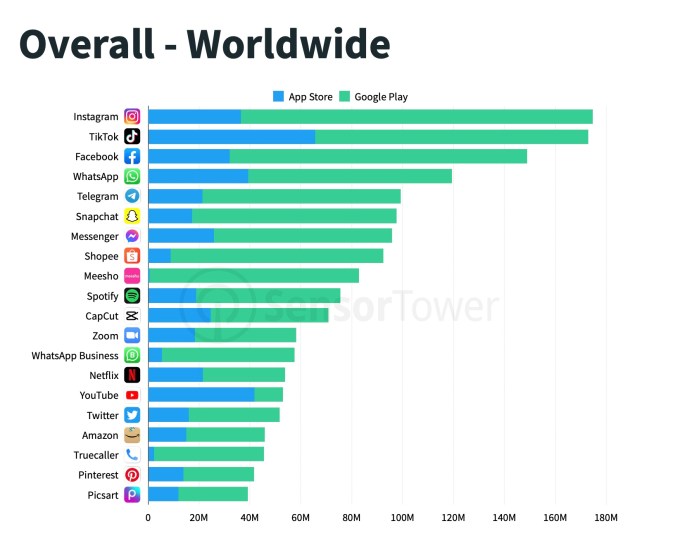
Image Credits: Sensor Tower
- Instagram continues to benefit from TikTok’s ban in India. The app has now reclaimed the top spot in terms of total downloads as of Q4 2021 — its best position since 2014. The only other time TikTok lost its No. 1 spot in the past two years was when Zoom become No. 1 in Q2 2020.
- Instagram was also spotted testing vertical scrolling for viewing Stories in its app. Testers saw that you could still tap left and right to navigate through one person’s Stories, but moving on to the next person’s Story would require a swipe down.
- Snapchat added new messaging tools. The app added new features that allow users to chat, react and survey friends across Android and iOS. Chat Replies let you respond to individual messages in a thread within an ongoing chat, similar to iMessage. Users can also take advantage of new features, like Bitmoji Reactions, Poll Stickers and an improved calling interface that makes it easier to add Lenses and see who’s joined a call before you join.
- Tumblr added a sensitive content toggle on iOS to comply with the App Store guidelines. The company’s app kept being rejected by reviewers over the app’s content. The toggle opts users out of seeing sensitive content by default — which is mature content, but not the same as adult content (eg. sex and pornography).
- Twitter is testing a search bar at the top of the Home tab, making it easier to search for tweets instead of having to change tabs.
- TikTok saw $2.3 billion in consumer spending in 2021, a figure that’s up 77% year-over-year, reported Sensor Tower. The app pulled in $824.4 million in Q4 2021 alone, more than double the same time a year ago. The U.S. is TikTok’s No. 2 revenue driver behind China.
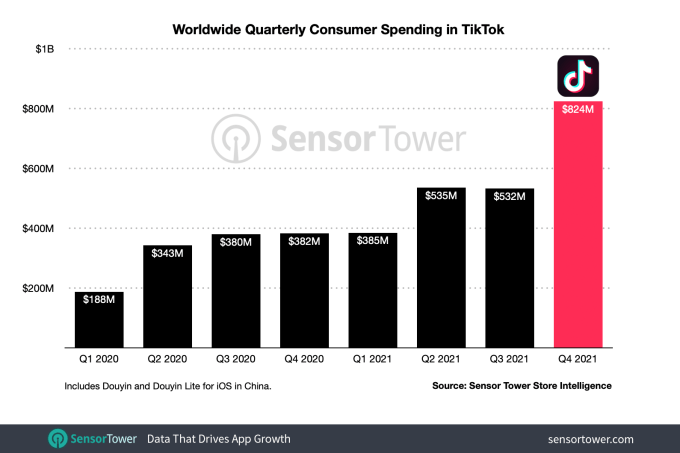
Image Credits: Sensor Tower
Messaging
- Signal founder Moxie Marlinspike is stepping down, in a move that seemed tied to cryptocurrency startup MobileCoin, which counts Marlinspike as a technical advisor. Signal had integrated with MobileCoin, boosting the adoption of the cryptocurrency. Marlinspike had been trying to maintain distance between himself and MobileCoin, but reporter Casey Newton recently pointed out that Signal’s push into untraceable payments is “playing with fire” and inviting regulation.
Streaming & Entertainment
- Spotify dropped the ball on the release of its previously announced HiFi tier, which was announced back in February but never arrived. The company finally responded to a growing chorus of consumer complaints to say only that the service was still in the works for Premium users, but without offering an ETA.
- Apple launched a new tvOS app this week called Apple Partner Media Review, which is not aimed at consumers, but rather, at studios. The app allows studios to review their content on an Apple TV prior to publication.
- A music app called AmpMe lowered its pricing after a well-known critic called it out as a scammer. The app was offering an unseemly $10 per week subscription for the app that syncs music between devices and was earning between $13-15 million per year. But the app was also committing fraud as it was plagued by fake reviews that doled out five-star ratings and praise. After news articles were published, the app maker lowered the pricing to $5/week and blamed the fake reviews on “outside consultants.”
- Netflix hiked its U.S. and Canadian prices by $1-$2. The standard plan in the U.S. now costs $15.49 up from $13.99 per month.
Health & Fitness
- A year-end report from Sensor Tower helps provide a look at how the COVID-19 pandemic shaped the app economy in 2021. Travel apps and transportation apps can still see growth ebb and flow amid COVID surges, but other app categories have either normalized or achieved their new normal. For instance, business app growth was still more than double pre-pandemic levels in 2021, and medical apps continue to see high usage.
- German police used a COVID contact-tracing app to track down witnesses to a potential crime, The Washington Post reported. The move is being criticized by privacy advocates who have argued that these systems could end up being used for non-public health purposes. It also could help fuel more conspiracy theories.
- Strava’s fitness app for runners and cyclists saw its revenue spike 68% over 2021, aided by the ongoing pandemic, Bloomberg reports. Based on previous figures, this would suggest the app has revenue of around $170 million and a paid subscriber base of 2-3 million. Including free users, the app has around 100 million users in total.
Productivity & Utilities
- Microsoft Teams rolled out its Walkie-Talkie feature to all users, two years after being announced. The feature lets users reach any contact through a push-to-talk function. The feature is integrated on Zebra devices and is now arriving on iOS.
- Mozilla’s Firefox Focus browser for Android devices gained access to the Total Cookie Protection feature, first introduced last year, which helps combat cross-site tracking.
News & Reading
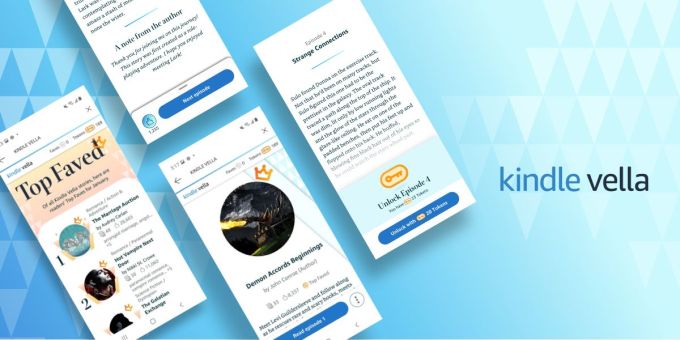
Image Credits: Amazon
- Amazon’s Kindle Vella episodic reading service launched on the Kindle app for Android and Fire tablets. Since its July 2021 launch, the service had been iOS-only.
Travel & Transportation
- Uber is facing competition from the government’s own taxi app as it tries to make inroads in Brazil, according to a report from Rest of World. Rio de Janeiro’s Taxi.Rio app has caught up to Uber’s technology and charges less, leading to users ditching Uber for taxis.
- Uber also quietly dropped support for the Apple Watch, as its watchOS app now directs users to switch to the app on their iPhone. The app likely didn’t have much adoption, as it’s easier to order an Uber from a bigger screen. Plus, an app can still send notifications to an Apple Watch even if it doesn’t offer a native Watch app.
Government & Policy
- A judge ruled the FTC’s monopoly (now revised) lawsuit against Meta can move forward. The case will examine if Meta holds an unlawful monopoly in social networks, which it gained by acquiring competitors like Instagram and WhatsApp. A ruling in the FTC’s favor could force Meta to split out its apps into separate businesses again.
- A new bill with bipartisan support would require sites and apps to offer a “summary statement” of their terms of service to make them easier for consumers to understand. These “nutrition labels” would note whether the sites pull in users’ precise location, health data, demographic info, race, religion, sex or more — data that’s often compromised in security breaches.
Funding and M&A
 Huge news this week sees mobile gaming giant Zynga snatched up by Grand Theft Auto’s maker, Take-Two Interactive in a $12.7 billion deal. The deal values Zynga at $9.86 per share — $3.50 in cash and the remaining $6.36 in shares of Take-Two common stock. Take-Two says the merger will make it one of the largest gaming companies overall, as it will result in $6.1 billion in 12-month Pro-forma net bookings. The deal isn’t just notable for its record size, but because it will give Take-Two a solid footing within the mobile gaming market, which is where today’s growth in gaming resides.
Huge news this week sees mobile gaming giant Zynga snatched up by Grand Theft Auto’s maker, Take-Two Interactive in a $12.7 billion deal. The deal values Zynga at $9.86 per share — $3.50 in cash and the remaining $6.36 in shares of Take-Two common stock. Take-Two says the merger will make it one of the largest gaming companies overall, as it will result in $6.1 billion in 12-month Pro-forma net bookings. The deal isn’t just notable for its record size, but because it will give Take-Two a solid footing within the mobile gaming market, which is where today’s growth in gaming resides.
 Indian startup Turnip raised $12.5 million in Series A funding for its mobile-first gaming community app. Greenoaks and Elevation Capital co-led the round for the app where gamers can livestream gameplay from their mobile devices, engage with fans and monetize.
Indian startup Turnip raised $12.5 million in Series A funding for its mobile-first gaming community app. Greenoaks and Elevation Capital co-led the round for the app where gamers can livestream gameplay from their mobile devices, engage with fans and monetize.
 Headspace Health (the entity formed by the merger of meditation app Headspace and on-demand mental health service Ginger) has now acquired the mental health and wellness company Sayana. The YC-backed startup helped users track their moods and offered self-care advice. Deal terms weren’t disclosed.
Headspace Health (the entity formed by the merger of meditation app Headspace and on-demand mental health service Ginger) has now acquired the mental health and wellness company Sayana. The YC-backed startup helped users track their moods and offered self-care advice. Deal terms weren’t disclosed.
 Jakarta-based investment app Pluang raised $55 million in a follow-on to its Series B round. The new investment was led by Accel and brings the total round to $110 million. The funds will be used to make the app, which now has 3.5 million registered users, available in more South Asian markets.
Jakarta-based investment app Pluang raised $55 million in a follow-on to its Series B round. The new investment was led by Accel and brings the total round to $110 million. The funds will be used to make the app, which now has 3.5 million registered users, available in more South Asian markets.
 Miami-based SMB banking app Novo raised $90 million in Series B funding at a $700 million valuation. VC firm Stripes led the round, which included existing investors from its Series A. The funds will help Novo build out its infrastructure and add new products to serve its 150,000 customers.
Miami-based SMB banking app Novo raised $90 million in Series B funding at a $700 million valuation. VC firm Stripes led the round, which included existing investors from its Series A. The funds will help Novo build out its infrastructure and add new products to serve its 150,000 customers.
 Spanish-language fantasy sports app Draftea raised $13.2 million in funding led by Kaszek, which also sees Sequoia making its first investment in a company headquartered in Mexico. The app, currently in private beta, charges sports fans a fee to draft a lineup of players and win daily cash prizes.
Spanish-language fantasy sports app Draftea raised $13.2 million in funding led by Kaszek, which also sees Sequoia making its first investment in a company headquartered in Mexico. The app, currently in private beta, charges sports fans a fee to draft a lineup of players and win daily cash prizes.
 Business banking startup Qonto, whose app targets SMBs and freelancers, raised $552 million in Series D funding at a $5 billion valuation. The round for the company, which now has 220,000 clients, was led by Tiger Global and TCV.
Business banking startup Qonto, whose app targets SMBs and freelancers, raised $552 million in Series D funding at a $5 billion valuation. The round for the company, which now has 220,000 clients, was led by Tiger Global and TCV.
 Estonia-based super app Bolt, which offers transportation and food delivery, raised $709 million at an $8.4 billion valuation to expand its services to new markets, including its newer business lines, like 15-minute grocery delivery, which will grow through the use of “dark stores” in more cities.
Estonia-based super app Bolt, which offers transportation and food delivery, raised $709 million at an $8.4 billion valuation to expand its services to new markets, including its newer business lines, like 15-minute grocery delivery, which will grow through the use of “dark stores” in more cities.
 Masters, an app for training with celeb athletes, closed on $2.7 million in seed funding led by Sweet Capital, the King.com founders fund. The company has signed up famous athletes include Shaun White, Emma Coburn, Kai Lenny, Ada Hegerberg, Petra Kvitova and others.
Masters, an app for training with celeb athletes, closed on $2.7 million in seed funding led by Sweet Capital, the King.com founders fund. The company has signed up famous athletes include Shaun White, Emma Coburn, Kai Lenny, Ada Hegerberg, Petra Kvitova and others.
Downloads
Locket

Image Credits: Bryce Durbin/TechCrunch
A widget-maker called Locket went viral for its clever app that lets you share photos to your friends’ homescreens. The app popped up to the top of the App Store charts in recent days, as users delighted in how it turned Apple’s widget system — typically used to showcase information like news, weather, inspirational quotes or photos from your own iPhone’s gallery — into a private social networking platform of sorts. Founder Matt Moss, a former WWDC student scholarship winner and recent UC Santa Barbara grad, said the idea for the app began as a side project he built for his girlfriend. But after friends said they also wanted in, he decided to publish it to the App Store.
The app launched on New Year’s Day and has now seen more than 2 million users sign up, according to Moss. On Sunday, Locket became the No. 1 app overall on the U.S. App Store, per Apptopia’s app store data, and had become the No. 1 Social Networking app the day prior. Apptopia reports only seeing around 1 million global installs so far, however, with about 31% from the U.S., as of earlier this week.
















 English (US) ·
English (US) ·